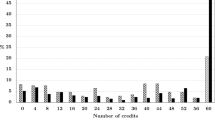Abstract
Students in six sections of a large undergraduate class were asked to record their class comments on notecards in all course units. Additionally, in some units, they received points toward their course grade based on their reported comments in class discussion. The study was conducted over a two-semester period, with slight variation in both the recording and crediting procedures across the two semesters. The primary goal of the study was to determine the effects of two credit and self-recording arrangements on initially low-responding students’ subsequent participation in class discussion (first semester n = 49, second semester n = 45). A higher percentage of low-responding students reported participating in class discussion when credit was given for participation than when no credit was awarded. Nonetheless, 39% of the initially low-responding students the first semester and 38% of the initially low-responding students the second semester did not participate in class discussion in any phase of the study.


Similar content being viewed by others
References
Angelo, T. A., & Cross, P. (1993). Classroom assessment techniques: A handbook for college teachers (2nd ed.). San Francisco, CA: Jossey-Bass.
Auster, C. J., & MacRone, M. (1994). The classroom as a negotiated social setting: An empirical study of the effects of faculty members’ behavior on students’ participation. Teaching Sociology, 22, 289–300. doi:10.2307/1318921.
Boniecki, K. A., & Moore, S. (2003). Breaking the silence: Using a token economy to reinforce classroom participation. Teaching of Psychology (Columbia, Mo.), 30, 224–227. doi:10.1207/S15328023TOP3003_05.
Bradley, M. E., Thom, L. R., Hayes, J., & Hay, C. (2008). Ask and you will receive: How question type influences quantity and quality of online discussions. British Journal of Educational Technology, 39, 888–900. doi:10.1111/j.1467-8535.2007.00804.x.
Dallimore, E. J., Hertenstein, J. H., & Platt, M. B. (2004). Classroom participation and discussion effectiveness: Student-generated strategies. Communication Education, 53, 103–115. doi:10.1080/0363452032000135805.
Erway, E. A. (1972). Listening: The second speaker. Speech Journal, 10, 22–27.
Fassinger, P. A. (1995). Professors’ and students’ perceptions of why students participate in class. Teaching Sociology, 24, 25–33. doi:10.2307/1318895.
Ferguson, N. B. (1986). Encouraging responsibility, active participation, and critical thinking in general psychology students. Teaching of Psychology, 13, 217–218.
Garside, C. (1996). Look who’s talking: A comparison of lecture and group discussion teaching strategies in developing critical thinking skills. Communication Education, 45, 212–227.
Harton, H. C., Richardson, D. S., Barreras, R. E., Rockloff, M. J., & Latane, B. (2002). Focused interactive learning: A tool for active class discussion. Teaching of Psychology (Columbia, Mo.), 29, 10–15. doi:10.1207/S15328023TOP2901_03.
Howard, J. R., James, G. H., III, & Taylor, D. R. (2002). The consolidation of responsibility in the mixed-age college classroom. Teaching Sociology, 30, 214–234. doi:10.2307/3211384.
Jones, R. C. (2008). The “why” of class participation. College Teaching, 56, 59–62. doi:10.3200/CTCH.56.1.59-64.
Junn, E. (1994). ‘Pearls of wisdom’: Enhancing student class participation with an innovative exercise. Journal of Instructional Psychology, 94, 385–387.
Karp, D. A., & Yoels, W. C. (1976). The college classroom: Some observations on the meaning of student participation. Sociology and Social Research, 60, 421–439.
Krohn, K. R., Foster, L. N., McCleary, D. F., Aspiranti, K. B., Nalls, M. L., Quillivan, C. C., Taylor, C. M., & Williams, R. L. (2008). Reliability of students’ self-recorded participation in class discussion (submitted).
McKinney, K. (2000). Teaching the mass class: Active/interactive strategies that have worked for me. In J. Sikora & T. O. Anoloza (Eds.), Introductory sociology resource manual (pp. 13–16). Washington DC: ASA Teaching Resources Center.
Morrison, T. L., & Thomas, M. D. (1975). Self-esteem and classroom participation. The Journal of Educational Research, 68, 374–377.
Porat, K. L. (1990). Listening: The forgotten skill. Momentum, 21(1), 66–68.
Schuelke, L. D. (1972). Subject matter relevance in interpersonal communication, skills, and instructional accountability: A consensus model. Paper presented at the Annual Meeting of the Speech Communication Association in Chicago, IL.
Smith, D. G. (1977). College classroom interactions and critical thinking. Journal of Educational Psychology, 69, 180–190. doi:10.1037/0022-0663.69.2.180.
Sommer, R., & Sommer, B. A. (2007). Credit for comments, comments for credit. Teaching of Psychology (Columbia, Mo.), 34, 104–106.
Weaver, R. R., & Qi, J. (2005). Classroom organization and participation: College students’ perceptions. The Journal of Higher Education, 76, 570–601. doi:10.1353/jhe.2005.0038.
Author information
Authors and Affiliations
Corresponding author
Rights and permissions
About this article
Cite this article
Foster, L.N., Krohn, K.R., McCleary, D.F. et al. Increasing Low-Responding Students’ Participation in Class Discussion. J Behav Educ 18, 173–188 (2009). https://doi.org/10.1007/s10864-009-9083-8
Received:
Accepted:
Published:
Issue Date:
DOI: https://doi.org/10.1007/s10864-009-9083-8




